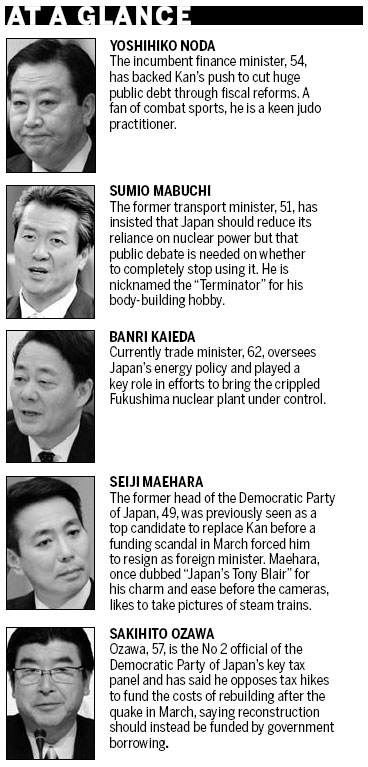Kan on way out, race on to take over

TOKYO - Japanese Prime Minister Naoto Kan confirmed on Tuesday that he would step down as head of the ruling party this week if two key bills were enacted, clearing the way to choose a new leader to cope with Japan's nuclear crisis and slew of economic ills.
A Japanese cabinet minister said the country will have a new prime minister by early next week.
Kan has faced demands to step down amid criticism of his handling of the March 11 earthquake and tsunami and subsequent nuclear crisis.
Polls show Kan's approval rating has fallen below 20 percent. Critics accuse him of a lack of leadership and survivors complain of slow relief efforts.
The race to become Japan's sixth leader in five years was blown wide open on Monday when former foreign minister Seiji Maehara, 49, decided to run.
That cut sharply into the chances of Finance Minister Yoshihiko Noda, a fiscal conservative. The support base for the two men overlaps in the Democratic Party of Japan (DPJ) - and whoever is elected next week as leader of the party with control of the lower house will become prime minister.
"What I said at today's meeting with cabinet ministers was that on Friday if the two pending bills pass parliament by then, I will resign as head of the DPJ," Kan told a parliamentary panel.
"Then, when the new leader is chosen, I will quit as prime minister, meaning the cabinet will resign en masse."
Japan's new leader must grapple with a soaring yen that threatens exports, rebuild from the March earthquake and tsunami, end a nuclear crisis at the crippled Fukushima plant and forge a new energy policy - all while trying to curb public debt and cure the ills of a fast-aging society.
But concerns run deep as to whether the next prime minister will fare any better than his predecessors in the face of a divided parliament and ruling party split by policies and personal feuds.
"The chances of a stable government capable of doing the bold and decisive things needed to deal with the problems in Tohoku (northeast Japan) and revitalize Japan are very, very low," said Columbia University professor Gerry Curtis. He suggested the next government could also be short-lived.
Reuters-AP


















